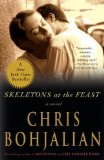Summary | Excerpt | Reading Guide | Reviews | Beyond the Book | Readalikes | Genres & Themes | Author Bio

Critics' Opinion:
Readers' Opinion:
First Published:
May 2008, 384 pages
Paperback:
Feb 2009, 384 pages
 Book Reviewed by:
Book Reviewed by:
Vy Armour
Buy This Book
Excerpted from the Prologue
JANUARY 1945
THE GIRL—A YOUNG WOMAN, REALLY, EIGHTEEN, HAIR the color of corn silk—had been hearing the murmur of artillery fire for two days now. Everyone had. A rare and peculiar winter thunderstorm in the far distance. Little more. The sconces in the living room hadn’t twitched, the chandelier in the ballroom (a modest ballroom, but a ballroom nonetheless) barely had trembled. The horses, while she was harnessing them and helping to load the wagons—short trips with bags full of oats (because, after all, so much would depend on the horses) and longer ones with some of the clothes and the silver and the jewelry they were going to take with them—had looked up. But the animals hadn’t expressed particular interest. If, Anna surmised, they had thought of anything they had thought of the cold: It was one of those frigid weeks when the days would alternate between whiteout-like snowstorms and periods so still that the smoke from the chimneys would rise up into a slate gray sky in lines that were perfectly straight.
These shells, however, the ones that were falling this afternoon, were great concussive blasts that had the people and the horses—a seemingly endless caravan of strangers that clogged the road and crushed the snow and ice along the sides, and had come almost to a complete stall now before the river—fretting and fidgeting in place. At each explosion the animals whinnied and the babies, hungry and chilled despite the blankets and furs in which they were swaddled, cried out. If they managed to free one of their little hands, the blue fist would lash out, a small, spring-loaded paddle. Clearly, however, the artillery had leapfrogged over them. Passed them. Hours earlier it had been many kilometers to the east. Now it was ahead of them to the west. Some of the shells were falling so nearby that they heard the screech—a strange foreign animal, something that might exist in a tree in Africa or South America, the girl thought—before the reverberant burst left them crouching, anxious, in their places in line. At first she presumed the Russians were trying to hit them, this long line of families trying desperately to flee to the west, to take out the carts and the wagons and the walkers piecemeal, but then she understood their real intent: It was the river itself. They were trying to smash the buttress-thick ice that coated this stretch of the Vistula from shore to shore like a skating rink and was serving as a bridge, because the nearest stone and cement overpass was twenty-five kilometers to the north. Along the shore she saw soldiers and Volkssturm teenagers—boys who were easily two and three years younger than her twin brother and her—funneling the refugees across what they believed was the safest part of the ice, but she had the sense that any moment now people were going to start leaving the queue and fanning out into the woods, where they would cross the river wherever they could.
Or, at least, believed that they could. The girl had heard stories of wagons and families disappearing yesterday and the day before through the ice to the north and the south. She wasn’t sure if they were true, but so much of the last month had been a study in how things she had once thought were inconceivable were actually happening. They’d all heard what had occurred three months earlier in Nemmersdorf. The Russians had captured the East Prussian village in October and held it for five days. When their own soldiers recaptured the small town, almost all of the civilians were dead. She had heard tales of girls her age (and younger) nailed naked to the sides of barns and farm carts, their arms spread wide as if they were being crucified but their legs splayed open so that even in death the men could violate them. There were the stories of small children flattened into the main roads of the village by the treads of tanks. Of live babies held by their ankles and swung like scythes into stone walls while their mothers were forced to watch, their children’s own blood and brains splattered like so much butcher’s waste onto their overcoats. Of the French prisoners of war—some people claimed as many as forty of them—who had been executed by the Russians for reasons that no one could fathom.
Excerpted from Skeletons at the Feast by Chris Bohjalian. Copyright © 2008 by Chris Bohjalian. Excerpted by permission of Shaye Areheart Books. All rights reserved. No part of this excerpt may be reproduced or reprinted without permission in writing from the publisher.





The House on Biscayne Bay
by Chanel Cleeton
As death stalks a gothic mansion in Miami, the lives of two women intertwine as the past and present collide.

The Flower Sisters
by Michelle Collins Anderson
From the new Fannie Flagg of the Ozarks, a richly-woven story of family, forgiveness, and reinvention.

The Funeral Cryer by Wenyan Lu
Debut novelist Wenyan Lu brings us this witty yet profound story about one woman's midlife reawakening in contemporary rural China.
Your guide toexceptional books
BookBrowse seeks out and recommends the best in contemporary fiction and nonfiction—books that not only engage and entertain but also deepen our understanding of ourselves and the world around us.